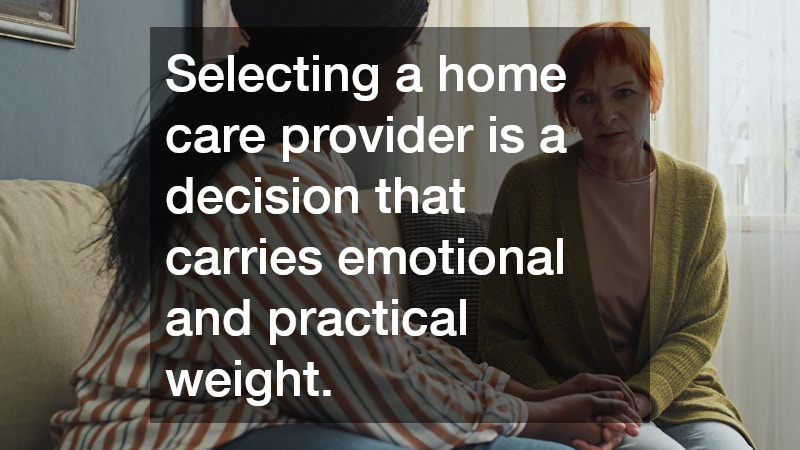Choosing the right support for a loved one is a significant decision that can have a profound impact on their wellbeing and quality of life. With the growing demand for in-home care services across Australia, families are presented with a wide range of options. However, not all providers offer the same level of care, professionalism or compassion. To ensure your family member receives the best support possible, it is crucial to approach the selection process with diligence and clarity. Here are seven essential tips to guide you in selecting the most suitable home care providers.
Understand Your Needs & Priorities
Before you begin comparing services, take time to assess the specific needs of the individual requiring care. Consider both short-term and long-term requirements.
Does the person need help with everyday tasks such as cooking and bathing or more specialised medical care such as wound dressing or medication management? Identifying these needs helps create a clear picture of the type of care required and sets the foundation for choosing a provider that aligns with those expectations. It also prevents paying for services that may not be necessary, helping families manage budgets more effectively.
Research & Compare Local Providers
With a defined list of care requirements, begin researching home care providers in your area. Look for agencies with a strong presence and good reputation within the community. Online reviews, testimonials and word-of-mouth referrals are valuable sources of information. Many providers offer initial consultations to help you understand their services, costs and care approach. Take this opportunity to ask specific questions and gauge their responsiveness and professionalism. Comparing several providers side-by-side can highlight key differences in offerings, pricing structures and levels of personalisation.
Check Qualifications & Accreditation
A reliable home care provider should meet all regulatory standards set by the Australian Government. Check that the organisation is registered with the Aged Care Quality and Safety Commission and complies with the Aged Care Quality Standards. This ensures they follow strict guidelines relating to client dignity, privacy, safety and service quality. Additionally, inquire about staff qualifications. Carers should be trained and certified in areas such as first aid, aged care or nursing, depending on the nature of the care being delivered. Transparency regarding staff credentials is a strong indicator of a provider’s professionalism.
Evaluate Communication & Transparency
Clear communication is at the heart of effective home care. From the initial enquiry to ongoing service delivery, the provider should be open and honest about what they offer, how they operate and what clients can expect. Contracts and service agreements must be detailed yet easy to understand. Be wary of vague promises or unclear pricing structures. A good provider will be upfront about costs, including any government subsidies that may apply and will help you navigate complex funding arrangements such as the Home Care Packages Program.
Prioritise Flexibility & Personalisation
No two individuals are alike and their care plans should reflect this. Look for home care providers that offer flexible services tailored to the client’s evolving needs. This might include varying visit times, adjusting levels of support or providing additional services as health conditions change. Providers that take the time to understand their clients’ personal preferences, routines and cultural background are better equipped to deliver compassionate and consistent care. Flexibility also includes accommodating family involvement, allowing loved ones to play an active role in the care journey.
Observe the Provider’s Approach to Staffing
The quality of care provided often depends on the people delivering it. Pay close attention to how the organisation recruits, trains and supports its carers. Continuity is also a crucial factor—having the same carer visit regularly helps build trust and comfort, especially for clients living with dementia or high care needs. Ask the provider about their policy on staff consistency and how they handle staff absences or scheduling changes. A dependable provider will have systems in place to minimise disruption and ensure ongoing support.
Look for a Focus on Holistic Wellbeing
Beyond meeting basic physical needs, top-tier home care providers focus on enhancing overall wellbeing. This means offering services that promote emotional, social and mental health, such as companionship, social engagement and assistance with hobbies or outings. Consider whether the provider values holistic care as part of their mission. Providers that encourage connection, independence and personal fulfilment can significantly improve the quality of life for clients, helping them remain active and engaged within their community.
Making the Right Choice for Compassionate, Reliable Care
Selecting a home care provider is a decision that carries emotional and practical weight. The right choice can enhance a loved one’s quality of life, support their independence and provide families with essential peace of mind. Take the time to assess each provider thoughtfully, as the benefits of trusted, high-quality care are long-lasting and deeply rewarding. Investing in a provider who truly understands and respects your loved one’s needs fosters not only better outcomes but also meaningful relationships that support wellbeing and dignity throughout the care journey. Ultimately, this thoughtful selection can lead to greater confidence, comfort and continuity in everyday life.
.




